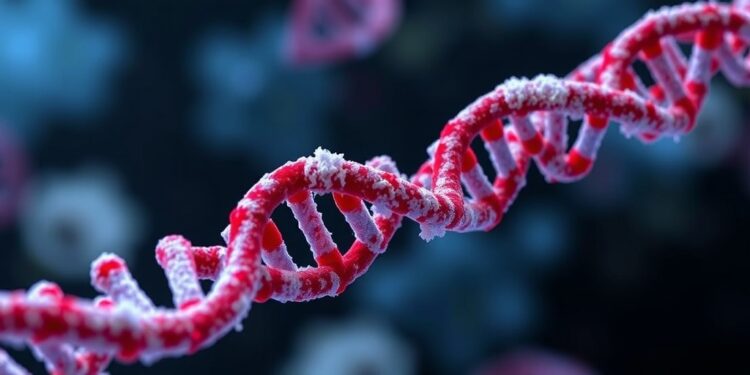
A New Mechanism for Triggering Inflammatory Immune Response Revealed in DNA-Damaged Cells
In a groundbreaking study from the University of California, Irvine, a team of researchers has unveiled a novel cellular mechanism that triggers an inflammatory immune response when cells sustain DNA damage. This revelation holds significant implications for the field of cancer treatment, paving the way for innovations that could lead to more effective, targeted therapies. The research, which was published online in the esteemed journal Nature Structural & Molecular Biology, could potentially alter the standard approaches to managing cancer and improve patient outcomes.
The process begins when cells experience DNA damage, a common occurrence linked to both environmental factors, such as ultraviolet (UV) radiation, and therapeutic agents, including well-known chemotherapeutics like actinomycin D and camptothecin. Previous research indicated that when both strands of DNA are broken, a pivotal enzyme known as ATM becomes activated. This, in turn, leads to the activation of the NF-κB protein, a crucial player in regulating inflammation in response to cellular stress. However, the specifics of how this signaling pathway operates under various types of DNA damage remained poorly understood until now.
The research team, led by postdoctoral fellow Elodie Bournique and assisted by graduate student Ambrocio Sanchez, has identified that another enzyme, IRAK1, plays a critical role in this inflammatory response. Specifically, when cells experience severe DNA damage, IRAK1 acts to enhance the activation of NF-κB, thereby promoting the secretion of various inflammatory signals. The linkage between DNA damage and immune response activation suggests that these processes are not isolated but rather interconnected in a manner that could influence the development of cancer.
Utilizing an advanced imaging technique, the researchers meticulously analyzed how NF-κB is regulated within individual cells. This high-resolution approach allowed for real-time tracking of cellular responses to DNA damage, uncovering a previously uncharacterized pathway that connects the release of the IL-1α protein to the activation of IRAK1 and subsequently NF-κB. Notably, the IL-1α protein does not exert its effects on the cell that releases it; instead, it travels to neighboring cells, signaling them to engage in an inflammatory response. This intercellular communication adds a layer of complexity to our understanding of cellular reactions to stress and injury.
The implications of these findings extend far beyond basic research. In the context of cancer treatment, understanding how different tumors react to DNA damage could facilitate the development of personalized therapies. The researchers found that the levels of IL-1α and IRAK1 vary significantly among different cancer cell types. Such variability indicates that patient responses to chemotherapeutic agents may differ widely, which complicates treatment strategies. By assessing the levels of these proteins prior to treatment, oncologists may be able to fine-tune therapeutic approaches, aiming for improved efficacy and reduced side effects.
The potential of these discoveries is significant, not only in terms of enhancing treatment responses but also in improving the overall quality of life for cancer patients. By gaining insights into the unique inflammatory profiles exhibited by different cancer types, healthcare providers could develop tailored interventions that mitigate adverse effects while maximizing therapeutic benefits. As the researchers continue their work, they will explore the functionality of this newly identified pathway through tests conducted on mouse models.
The broader research community has long posited that inflammation plays a dual role in cancer—both promoting and inhibiting tumor growth, depending on the context. By elucidating how these inflammatory responses are initiated in response to DNA damage, this study contributes to an evolving narrative in cancer biology, potentially offering new avenues for therapeutic intervention. Traditional models have often viewed cancer through a lens of purely genetic mutations, but this work emphasizes the importance of understanding transactional pathways involving immune responses.
As knowledge of cancer biology progresses, the need for precision in treatment will only become more critical. This research emphasizes the necessity of interdisciplinary approaches that merge immunology and oncology, underscoring the potential of inflammatory pathways as therapeutic targets. The activation of NF-κB via IRAK1 could represent a key mechanism through which inflammation mediates cellular responses to cancer therapy, offering a new target for pharmaceutical development.
As the implications of this breakthrough continue to unfold, the opportunity for new clinical applications is immense. Collaboration between developmental biologists, immunologists, and oncologists will be essential for translating these findings into practical treatments. Understanding how to manipulate these inflammatory pathways could result in novel strategies to combat cancer, providing hope for patients with varying responses to conventional therapies.
This research not only highlights the intricacy of cellular signaling in response to DNA damage but also illustrates the urgent need for further investigations into personalized medicine. The quest to understand the differential responses among cancer cell types represents a frontier in cancer therapeutics, and the insights gleaned from this study could be instrumental in shaping future research trajectories.
In conclusion, the identification of IRAK1 and IL-1α’s roles in the inflammatory response to DNA damage presents a novel understanding of cancer cell biology. It sets the stage for a new era of cancer research focused on individualized therapies that consider the inflammatory status of tumors. The discoveries made by the UC Irvine research team signal an important step forward in our fight against cancer, offering hope for improved treatment protocols that prioritize patient outcomes.
Subject of Research: Mechanisms of inflammatory immune response in DNA-damaged cells.
Article Title: ATM and IRAK1 orchestrate two distinct mechanisms of NF-κB activation in response to DNA damage.
News Publication Date: January 6, 2025.
Web References: Nature Structural & Molecular Biology.
References: To be determined based on further studies and citations from published work.
Image Credits: Not applicable.
Keywords: Inflammatory response, DNA damage, NF-κB activation, cancer therapy, personalized medicine.





